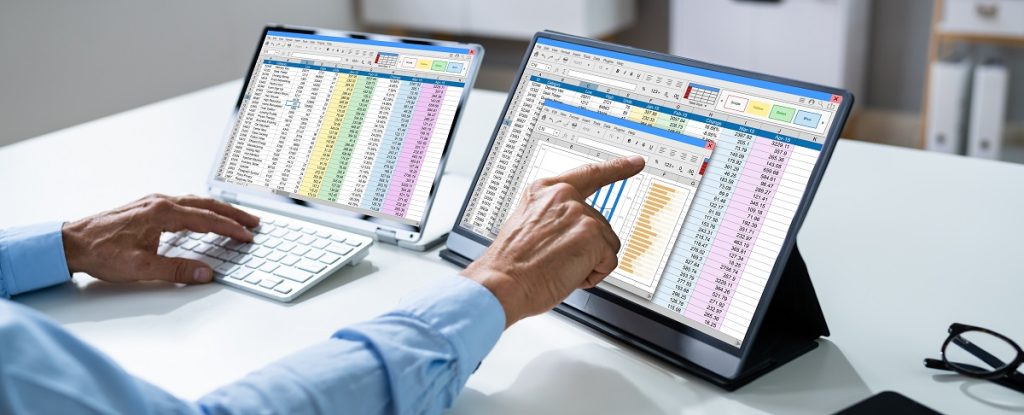Data entry is clerical work that uses typing or voice recording to enter data into a document, spreadsheet, or form on a computer. Various data entry jobs might be called typist, coder, transcriber, or word processor. Data entry clerks are important to many industries, including finance, healthcare, retail, and transportation.
Due to relatively high demand and low education requirements, data entry jobs from home are available to job seekers from almost any background. Although many jobs of this type are low-paying, there are opportunities to score a high-paying position, depending on the industry.
What are must-haves for a data entry clerk in terms of skills and equipment? Where can you find remote data entry work? Which jobs tend to pay more? How do you avoid getting scammed while job searching?
Table of Contents
What Is Data Entry Work?
Data entry is electronic data processing. It entails entering information into a database or computer system and keeping it up to date, usually by using word processing programs or typing manually. Inputting information can also be done by scanning documents or voice recording. Data entry work is essential for keeping data accurate, organized, and updated across various industries.

What Skills Are Necessary For Data Entry Work?
Data entry jobs require both soft and technical skills. Some examples of the necessary skills are:
- Accuracy
- Attention to detail
- Multitasking
- Research skills
- Fast typing
- Standard computer software proficiency (Microsoft Office, PowerPoint, etcetera)
- Word processing software knowledge (Microsoft Word, Google Docs, etcetera)
- Database software proficiency (Excel, Google Sheets, Microsoft Access, etcetera)
How Can I Work As A Data Entry Clerk From Home?
To become a remote data entry clerk, first, ensure that you have good typing skills, a reliable internet connection, and are efficient, reliable, and self-motivated. Work-from-home data entry jobs are not complex, but they require discipline, uninterrupted focus, and at times, long hours, so adjust your home work environment to be as quiet and pleasant as possible.
Next, begin your job search. Look for a work-at-home position. For instance, you can search for online data entry job postings, data entry operator roles, or administrative assistant jobs. You will come across part-time and full-time data entry jobs. Alternatively, look for freelance gigs if you want to do this type of work temporarily or gain data entry experience.

Finally, tailor your resume to showcase relevant data entry skills, certifications, or previous experience, and apply to jobs that are a good fit for you. You can apply to entry-level data entry specialist positions with little to no experience. Some employers may offer to provide additional training as well.
What Types Of Data Entry Jobs Can You Do From Home?
A data entry job usually consists of:
- Maintaining databases
- Sorting information
- Entering alphabetic, numeric, and symbolic data into the system as per company guidelines
- Data collection and reviews
- Creating backups
- Solving problems such as various deficiencies, data duplicates, or errors
Specific duties vary by industry and company.
Types of remote data entry roles are:
- Typists
- Coders
- Word processors
- Computer operators
- Customer service representatives
- Transcribers
- Secretaries
- Legal administrative support
- Health information technicians
- Bookkeeping and payroll clerks
- License clerks

What Do You Need To Do The Work?
For a remote data entry job, the following is a must:
- Home office setup/designated spot in your home where you can work with minimal distractions
- Laptop/computer
- Keyboard, usually alphanumeric
Additionally, you’ll need to install company-specific software on your computer and may need equipment such as headphones with a microphone.
Can A Beginner Do Data Entry?
You can do most administrative tasks or typing jobs as a beginner as long as you are detail-oriented, able to work as a team member or independently, and have good communication skills. Most data entry jobs from home don’t require a bachelor’s degree — a high school diploma or a GED is usually enough. Employers focus more on your ability to meet deadlines and produce accurate data entry than formal education.
Can You Really Make Money Doing Data Entry At Home?
Various industries need data entry clerks and post legitimate job ads, so you can make money doing this type of remote work. However, there isn’t long-term potential and no real opportunities to advance.
Many remote workers eventually move on to other jobs they can do at home. One of the reasons is these jobs are entry-level and not lucrative. Moreover, people may want to pursue a more fulfilling career over time.
The average salary of a data entry clerk is $17.69 per hour, and many jobs start as low as $10-12 per hour. The more analytical skill required in a position, the more likely it is to pay more.
Data entry is required in many jobs that pay more, but the pay reflects other skills needed to do the job, not just data entry prowess.
The average wages depend on the industry and employees’ credentials. For example, a full-time remote customer service representative role has an estimated annual salary range of $33,000 to $50,000. A bilingual contact center service agent position pays over $50,000 and may even reach $70,000 per year. A medical coder must be certified and can get anywhere between $60,000 and $101,000 per year.

The pay also depends on the city, even though it is a remote position. This may negatively impact remote data entry clerks in high-cost-of-living areas. For instance, a company located in New York will offer higher rates than the one in Jacksonville. This may sound great, but if you are receiving a lower average salary yet you live in a costly city, you’re at a disadvantage and will have to either look for additional work or switch jobs.
How Are Data Entry Personnel Usually Paid?
Payment depends on the job type. If you’re a short-term hired contractor, the company will likely pay per project. Long-term, ongoing data entry jobs are typically paid per hour. In this case, the company may require you to use time-tracking software to log your hours. Alternatively, you may be paid by keystrokes per minute, word, or hour.
How Can You Avoid Data Entry Scams?
Similarly to work-from-home packing jobs, if a data entry job offer sounds too good to be true, it is. Typical red flags are:
- Upfront fees are required to start working.
- High pay is promised for easy work.
- The company is nonexistent or has little to no internet presence.
- You’re required to disclose sensitive information, like your bank account info or Social Security number.
- Receiving a random “job offer” via social media or email.
To avoid data entry scams, carefully look at the job description and vet the company thoroughly. Only apply once you’re sure it’s legitimate. Also, do not entertain a time-wasting scammer approaching you on Instagram, for example. Real recruiters may find you by the suggestion and recommendation system, but they hire on business-focused platforms like LinkedIn.
What Companies Hire Remote Data Entry Clerks?
Companies that frequently hire remote data entry specialists belong to various industries. Some examples are:
- Amazon
- LHH Recruitment Solutions (previously Ajilon)
- CVS Health
- Data Dimensions
- Lincoln Financial Group
If you’re interested in a specific company, visit its official website and check out the careers page to see if they’re hiring remote data entry clerks.
What Sites Can You Use To Find Remote Data Entry Jobs?
There are several ways of finding these jobs. If you’re looking for a project-based temporary position, check out freelancing platforms, such as:
For a longer-term opportunity, use job boards and job search engines like:
Sign in to those websites to receive job alerts via email. Regardless of your preferred job type, remember to join business-oriented networking sites such as LinkedIn.


